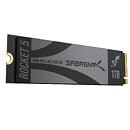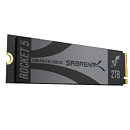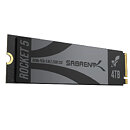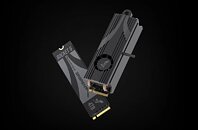- Joined
- Oct 9, 2007
- Messages
- 47,895 (7.38/day)
- Location
- Dublin, Ireland
| System Name | RBMK-1000 |
|---|---|
| Processor | AMD Ryzen 7 5700G |
| Motherboard | Gigabyte B550 AORUS Elite V2 |
| Cooling | DeepCool Gammax L240 V2 |
| Memory | 2x 16GB DDR4-3200 |
| Video Card(s) | Galax RTX 4070 Ti EX |
| Storage | Samsung 990 1TB |
| Display(s) | BenQ 1440p 60 Hz 27-inch |
| Case | Corsair Carbide 100R |
| Audio Device(s) | ASUS SupremeFX S1220A |
| Power Supply | Cooler Master MWE Gold 650W |
| Mouse | ASUS ROG Strix Impact |
| Keyboard | Gamdias Hermes E2 |
| Software | Windows 11 Pro |
Sabrent today announced its latest flagship M.2 NVMe SSD series, the Rocket 5. Built in the M.2-2280 form-factor, the Sabrent Rocket 5 is sold as a bare drive, with an included fan-heatsink that you install if needed. This cooler comes with a tiny fins-stack, two copper heat pipes, and a 20 mm fan. At the heart of the drive is the new Phison PS5026-E26 Max14um controller, paired with Micron B58R 232-layer 3D TLC NAND flash memory, and LPDDR4 based DRAM cache. The drive comes in 1 TB, 2 TB, and 4 TB capacity variants.
The company didn't put out capacity-specific performance or endurance numbers, but mentioned sequential read speeds of up to 14 GB/s, as is characteristic of the Max14um controller variant; up to 12 GB/s sequential write speeds, up to 1.55 million IOPS 4K random reads, with up to 1.8 million IOPS 4K random writes. The Rocket 5 replaces the Rocket 4 Plus as Sabrent's flagship SSD. The 4 TB variant is listed at $730, the 2 TB variant at $340, and the 1 TB variant at $190.




View at TechPowerUp Main Site
The company didn't put out capacity-specific performance or endurance numbers, but mentioned sequential read speeds of up to 14 GB/s, as is characteristic of the Max14um controller variant; up to 12 GB/s sequential write speeds, up to 1.55 million IOPS 4K random reads, with up to 1.8 million IOPS 4K random writes. The Rocket 5 replaces the Rocket 4 Plus as Sabrent's flagship SSD. The 4 TB variant is listed at $730, the 2 TB variant at $340, and the 1 TB variant at $190.




View at TechPowerUp Main Site



